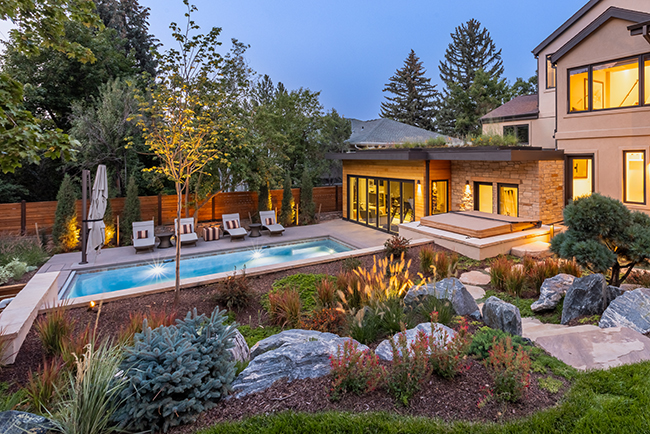Farm Fare: Farm-to-Table Dining
03 Apr 2015
Farm-to-table dining is not only festive, it enriches the community and the spirit.
By Ainslee Kellogg Mac Naughton To skeptics of farm-to-table dining, Eric Skokan offers this challenge: Eat a spring pea harvested in early June at his farm and then eat a spring pea bought at the grocery store. “You can really taste the difference. You put the two peas side by side, and there’s no doubt in anyone’s mind,” says Skokan, a self-proclaimed pea fanatic, chef, and owner of Black Cat Farm, Black Cat Bistro and Bramble and Hare. “The farm pea tastes alive.” [pp_gallery gallery_id="10977" width="150" height="150"]See links to farms that offer dinners below
Farm-to-table dining means creating meals with the freshest locally grown food, as opposed to vegetables harvested a week ago and shipped here from elsewhere. At Black Cat, food picked at Skokan’s 130-acre farm makes it to his restaurants within hours. “The tomato on your plate was probably harvested yesterday, rather than last week,” says Sara Martinelli, of the food at her local restaurants that include Chautauqua Dining Hall, Leaf Vegetarian Restaurant and Zucca. Martinelli and her husband, Lenny, own Three Leaf Concepts, which encompasses the couple’s 10-acre Three Leaf Farm and seven restaurants. “As global awareness of environmental issues is raised, eating foods that are local gives people a stronger appreciation for the land and the region where they live,” she says. For all its benefits, farm-to-table dining creates unique challenges for the restaurants that emphasize it. A restaurant buying conventional produce might have to switch up a menu for a night if a shipment doesn’t come through. But a restaurant relying on its farm for produce might have to completely revamp its menu for the season if a crop fails.
“You know, in the Top Chef–type TV shows where they come out and say, ‘Your secret ingredient is radishes!’ or whatever and they have to cook something—we do that every day,” Skokan says. “It’s so hard for the cooks, to feel like they’ve had the rug pulled out from under them. They come in with a plan and that plan gets trashed because of the farm. It’s frustrating and challenging, but everybody adapts and you go from being someone who cooks from recipes to someone who just cooks.”
For all its benefits, farm-to-table dining creates unique challenges for the restaurants that emphasize it. A restaurant buying conventional produce might have to switch up a menu for a night if a shipment doesn’t come through. But a restaurant relying on its farm for produce might have to completely revamp its menu for the season if a crop fails.
“You know, in the Top Chef–type TV shows where they come out and say, ‘Your secret ingredient is radishes!’ or whatever and they have to cook something—we do that every day,” Skokan says. “It’s so hard for the cooks, to feel like they’ve had the rug pulled out from under them. They come in with a plan and that plan gets trashed because of the farm. It’s frustrating and challenging, but everybody adapts and you go from being someone who cooks from recipes to someone who just cooks.”
 That learning curve can be expensive, though. When Skokan and his wife, Jill, started their farm in 2006, he’d only had personal gardening experience. “There’s no book out there like, ‘Oh, you want to open a restaurant and have a farm? Here’s how you do it.’ So Jill and I have done every bit of the R and D ourselves,” Skokan says. “We’ve paid for every one of the brutal mistakes we’ve made. All the spectacular successes and every spectacular failure come right out of our checkbook.”
Luckily for current aspiring farmers, the Lyons Farmette sustainable farm and education center offers basic agriculture classes, cooking classes and even specialized classes, like spinning and knitting, that use fibers from the farm’s alpacas and angora goats. The Farmette also offers farm-to-table dinners and invites different chefs to host them at two outdoor venues. Betsy Burton, a former teacher who runs the Farmette, has emphasized community from the start. “We now do many farm dinners and weddings, but being a small, working organic farm and education center is the underlying theme here,” she says.
That learning curve can be expensive, though. When Skokan and his wife, Jill, started their farm in 2006, he’d only had personal gardening experience. “There’s no book out there like, ‘Oh, you want to open a restaurant and have a farm? Here’s how you do it.’ So Jill and I have done every bit of the R and D ourselves,” Skokan says. “We’ve paid for every one of the brutal mistakes we’ve made. All the spectacular successes and every spectacular failure come right out of our checkbook.”
Luckily for current aspiring farmers, the Lyons Farmette sustainable farm and education center offers basic agriculture classes, cooking classes and even specialized classes, like spinning and knitting, that use fibers from the farm’s alpacas and angora goats. The Farmette also offers farm-to-table dinners and invites different chefs to host them at two outdoor venues. Betsy Burton, a former teacher who runs the Farmette, has emphasized community from the start. “We now do many farm dinners and weddings, but being a small, working organic farm and education center is the underlying theme here,” she says.
More than a Meal
 Farm dinners offer an up-close view of the usually behind-the-scenes local farms, and the dinners are more like community events than simply meals. The Lyons Farmette invites nonprofits to sell beer or wine to raise money for their cause. “I think one of the main benefits and reasons people love farm dinners is not only the delicious and amazing produce from the gardens surrounding the dinner, but the sense of fun and community at each dinner,” Burton says. “The idea of getting together with friends and having wine, a farm tour and then dining under the stars is the draw. What could be better on a summer’s eve?”
At Three Leaf Farm, guests meet the animals and tour the farm before sitting down for dinner. “I think it’s truly a spiritually enriching experience to recognize and celebrate the source of our food,” Martinelli says. “Additionally, it gives our chefs an opportunity to be extra creative with the seasonal food and to showcase their own talents.”
In addition to farm dinners, Lyons Farmette and Black Cat Farm provide locally grown organic produce to subscribers through CSA (Community-Supported Agriculture) programs. Another aspect of farm-to-table dining is environmental sustainability and community enhancement. Three Leaf Farm uses compost from its restaurants on the farm, and is moving toward a completely sustainable model. Black Cat Farm supplies local school districts with fresh food to feed students. “Jill and I have this very old-fashioned, deeply held view of what restaurants are,” Skokan says. They’re really all about hospitality. In the truest sense, that’s the simple desire to take care of people.”
Whether at a restaurant, at a farm or in your own backyard, feasting on locally grown produce brings food full circle, with its focus on sustainability and flavor. “Very quickly one realizes how much organic farming is a labor of love,” Martinelli says. “It greatly deepens your respect for the food chain. The food that is harvested from the farm is special, and treated as a treasure.”
With so many options to try farm-to-table dining in Boulder County, why not take Skokan’s spring pea challenge?
Farm dinners offer an up-close view of the usually behind-the-scenes local farms, and the dinners are more like community events than simply meals. The Lyons Farmette invites nonprofits to sell beer or wine to raise money for their cause. “I think one of the main benefits and reasons people love farm dinners is not only the delicious and amazing produce from the gardens surrounding the dinner, but the sense of fun and community at each dinner,” Burton says. “The idea of getting together with friends and having wine, a farm tour and then dining under the stars is the draw. What could be better on a summer’s eve?”
At Three Leaf Farm, guests meet the animals and tour the farm before sitting down for dinner. “I think it’s truly a spiritually enriching experience to recognize and celebrate the source of our food,” Martinelli says. “Additionally, it gives our chefs an opportunity to be extra creative with the seasonal food and to showcase their own talents.”
In addition to farm dinners, Lyons Farmette and Black Cat Farm provide locally grown organic produce to subscribers through CSA (Community-Supported Agriculture) programs. Another aspect of farm-to-table dining is environmental sustainability and community enhancement. Three Leaf Farm uses compost from its restaurants on the farm, and is moving toward a completely sustainable model. Black Cat Farm supplies local school districts with fresh food to feed students. “Jill and I have this very old-fashioned, deeply held view of what restaurants are,” Skokan says. They’re really all about hospitality. In the truest sense, that’s the simple desire to take care of people.”
Whether at a restaurant, at a farm or in your own backyard, feasting on locally grown produce brings food full circle, with its focus on sustainability and flavor. “Very quickly one realizes how much organic farming is a labor of love,” Martinelli says. “It greatly deepens your respect for the food chain. The food that is harvested from the farm is special, and treated as a treasure.”
With so many options to try farm-to-table dining in Boulder County, why not take Skokan’s spring pea challenge?

 Summer’s sweet fare translates to farm tables full of dishes with fresh, local ingredients. Book your farm dinner this spring, because they fill up fast!
Summer’s sweet fare translates to farm tables full of dishes with fresh, local ingredients. Book your farm dinner this spring, because they fill up fast!










